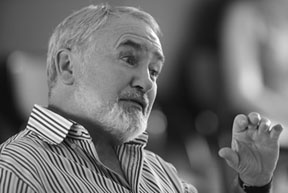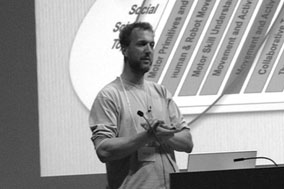Keynotes Lectures
How Humans Learn New Skills
Professor J.A. Scott Kelso1,2
1 Human Brain & Behavior Laboratory Center for Complex Systems and Brain Sciences, Florida Atlantic University
2 Intelligent Systems Research Centre University of Ulster, Magee Campus Derry, N. Ireland

Abstract
There is an old saying "Review the past and know the future". The first part of this talk reviews theories and approaches to skill learning over the last 40 years with an eye to answering the question: why do people get better with practice? The main ideas emanating from at least eight different perspectives will be considered, spanning the disciplines of psychology, engineering and robotics, folklore and neuroscience. All are found wanting in one way or another, perhaps most fundamentally because they assume that skill learning is basically an error correction, and ultimately error reducing, process with KR and feedback acting as a kind of reinforcement and/or as a means to more effective motor programming. At best, this is only part of the story, perhaps only pertinent to simple movements. What is missing from these accounts? For the most part in the search for general rules of learning, they miss that newly learned skills do not arise from a "raw", undifferentiated behavioral repertoire, but from an individual-specific background of pre-existing dispositions or tendencies (intrinsic dynamics) where stability (not just error) plays a central role. More generally, they fail to address the essence of skilled behavior in complex biological and social systems like ourselves: how do new spatiotemporal organizations (functional synergies) arise and how are existing synergistic patterns modified or discarded over the course of learning? What is the nature of individual change and what factors govern change? The second part of the talk will present a conceptual and empirical framework for understanding skill learning called coordination dynamics. Coordination dynamics uses the concepts, methods and tools of self-organizing dynamical systems tailored specifically to the intentional, goal-directed behavior of living things, human beings in particular. 'Ecologically valid' laboratory experiments and theoretical modeling will be used in an effort to extract a set of messages, if not principles, that convey the essence of skill learning, and thereby help guide future research on SKILLS. A key result is that laws of learning and associated processes, including attending, remembering and forgetting, are shown to be formed in terms of individual-specific tendencies rather than despite them. The paradox for the individual learner or learning system is that in order to acquire some.
Biography
Scott Kelso holds the Glenwood and Martha Creech Eminent Scholar Chair in Science at Florida Atlantic University (FAU), FL, USA. Before joining FAU, Kelso was Senior Research Scientist at Yale University's Haskins Laboratories. Kelso's research uses the concepts and tools of coordination dynamics along with behavioral and brain imaging methods to understand how human beings (and human brains) coordinate behavior and learn new skills. In 1985 he founded the Center for Complex Systems and Brain Sciences at FAU, an interdisciplinary research center that includes neuroscientists, applied mathematicians, physicists, psychologists and computer scientists housed in the same physical facility, working together on common problems of complex, biological systems ranging from molecules to minds. Kelso leads a team of researchers in the Center's Human Brain and Behavior Laboratory. Scott Kelso is also Professor of Psychology, Biological Sciences, and Biomedical Sciences at FAU and at the University of Ulster in Derry, N. Ireland. He was Program Director of the NIMH's National Training Program in Complex Systems and Brain Sciences at Florida Atlantic University between 1987 and 2005. Working with the FAU Administration and the Chancellor's office of the State University System, Kelso helped establish the Center's PhD Degree in Complex Systems and Brain Sciences.
A Computational Approach to Learning Motor Skills
Professor Stefan Schaal1, 2, 3
1 Computer Science, Neuroscience, and Biomedical Engineering, Univ. of S. California, Los Angeles, USA
2 Max-Planck-Institute for Intelligent Systems, Tübingen/Stuttgart, Germany
3 ATR Computational Neuroscience Laboratories, Kyoto, Japan

Abstract
Skillful and goal-directed interaction with a dynamically changing world is among the hallmarks of human perception and motor control. Understanding the mechanisms of such skills and how they are learned is a long-standing question in both neuroscience and technology. This talk develops a general framework of how motor skills can be learned. At the heart of our work is a general representation of motor skills in terms of movement primitives as nonlinear at-tractor systems, the ability to generalize a motor skill to novel situations and to adjust it to sudden perturbations, and the ability to employ imitation learning, trial-and-error learning, and model-based learning to improve planning and control of a motor skill. Our framework has close connections to known phenomena in behavioral and neurosciences, and it also intuitively bridges between dynamic systems theory and optimization theory in motor control, two rather disjoint approaches. We evaluate our approach in various behavioral and robotic studies with anthropomorphic and humanoid robots.
Biography
Stefan Schaal is Professor of Computer Science, Neuroscience, and Biomedical Engineering at the University of Southern California, and an Invited Researcher at the ATR Computational Neuroscience Laboratory in Japan, where he held an appointment as Head of the Computational Learning Group during an international ERATO project, the Kawato Dynamic Brain Project (ERATO/JST). Before joining USC, Dr. Schaal was a postdoctoral fellow at the Department of Brain and Cognitive Sciences and the Artificial Intelligence Laboratory at MIT, an Invited Researcher at the ATR Human Information Processing Research Laboratories in Japan, and an Adjunct Assistant Professor at the Georgia Institute of Technology and at the Department of Kinesiology of the Pennsylvania State University. Dr. Schaal's research interests include topics of statistical and machine learning, neural networks, computational neuroscience, functional brain imaging, nonlinear dynamics, nonlinear control theory, and biomimetic robotics. He applies his research to problems of artificial and biological motor control and motor learning, focusing on both theoretical investigations and experiments with human subjects and anthropomorphic robot equipment.


